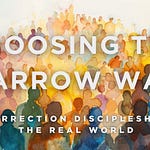Gracious and generous God,
we come to you with cluttered hearts and tired minds.
Some of us are chasing more.
Some of us are trying to hold on to what we have.
Some of us are just trying to catch our breath.
We confess we have trusted treasure that cannot last.
We have served masters who do not love us back.
And we are weary.
But you, O Christ, are not here to shame us.
You are here to free us.
So open our eyes, not just to see, but to see clearly.
Open our ears, not just to hear, but to hear you.
And open our hearts, not just to feel, but to follow.
Give us ambition that looks like grace.
Desire that turns into mercy.
And hope that lasts longer than moths and rust.
Speak, Lord, because we are listening.
Amen.
Many have spent a lifetime building. Homes. Businesses. Investment accounts. Reputations. Networks. A stable future for our families, secured through strategic planning, weathering financial storms, and at times sheer luck. They have worked hard, been smart, and patient. And, Jesus does not call that a sin.
Others have heard a different promise.
Then there are those who were told success would come if they would only do the “right things” – good grades, college, invest early, and plan wisely. Security would follow. Treasure would follow. For some, that was true, but for many, that treasure came with a chain.
Rather than swimming in success, many find themselves drowning in debt.
And then, there are those for whom our definition of success is but a dream.
And through it all, success, debt, and anxiety have only increased. Our mental health has deteriorated. The promise of treasure has turned into a burden some cannot seem to lay down. Anxious. Distracted. Afraid of losing what they have.
And Jesus wants to know, what’s the end game?
This is not a parable (thank God!). This is a question.
Where’s your treasure?
What Jesus says next does not come with condemnation. It comes with clarity. “Do not store up for yourselves treasures on earth, where moth and rust consume and where thieves break in and steal.”[i]
It’s true. Moths eat, and rust corrodes. Thieves break in, markets fall, and prices fluctuate. For many, our retirement accounts have become sources of anxiety instead of security and comfort. Jesus does not have to invoke the wrath of God, the judgment of God, to grab our attention. He names the facts we would rather ignore.
“Where your treasure is, there your heart will be also”[ii]
This is diagnostic and not demanding. What you love reveals itself in what you store. What you trust shows up in spreadsheets. We are not talking about vague beliefs or a few spiritual feelings. We are talking about the location of our hearts.
Dietrich Bonhoeffer put it like this: “Where our treasure is, there is our trust, our security, our consolation, and our God.”[iii]
And let’s be real for a minute. What we cling to reveals what we worship, and what we worry about reveals what we have crowned king.
Jesus wants your heart free.
Not because he is trying to empty your hands, but because he is trying to open them.
Jesus is trying to make room.
Jesus isn’t done. He keeps going, turning from treasure to vision. He says, “The eye is the lamp of the body. So if your eye is healthy, your whole body will be full of light.”[iv]
It sounds poetic, but he’s not talking about eyesight. Jesus is talking about focus, clarity, and devotion.
Dietrich Bonhoffer again: “The follower of Christ is in the light only so long as he looks simply to Christ and nothing else in the world.”[v] Simply does not imply naivety. It means undivided, undistracted, undeterred.
We do not see straight. We are cross-eyed. One eye on Jesus and the other on the market.
One eye on the Kingdom of God and the other on our equity.
One eye on Our Calling and the other on our comparison to everyone.
To that, Christ says that kind of vision leads to darkness.
Divided eyes make for divided hearts.
Divided hearts cannot handle pressure. They are anxious, torn, and exhausted.
We know this, right?
We trust God, but still check balance sheets before the Beatitudes. We pray for the coming of the Kingdom of God, but still plan for the worst. And Jesus says, “No one can serve two masters, for a slave will either hate the one and love the other or be devoted to the one and despise the other. You cannot serve God and wealth.”[vi] Not “you shouldn’t.” Not, “you might struggle.”
You can’t.
Dietrich Bonhoeffer, one more time: “We shall indignantly repudiate the suggestion that we hate God and will be firmly convinced that we love God, whereas by trying to combine love for him with love for the world, we are turning our love for God into hatred.”[vii]
That’s not hyperbole, that’s spiritual physics. Trying to love God and wealth does not divide our love; it corrupts. It turns us into the people we do not want to be.
But this isn’t a sermon about giving up.
Theologian Frederick Bruner is helpful here. He wrote: “Jesus does not quash ambition; He elevates it. The Christian is to be ambitious, passionate, acquisitive, enterprising for the Father’s approval, for the ‘well done’ of God’s final judgment. Thus, Jesus’ ethic is not so much aesthetic as it is athletic.”[viii]
That is the planning we need, especially for those who have spent their lives building and achieving their goals.
Jesus isn’t trying to crush your ambition; He’s resurrecting it. He’s not asking you to slow down. He’s asking, “Where are you going?”
It’s not less passion; it’s a new direction.
Jesus is not opposed to treasure. He’s just saying that the best stuff doesn’t fit into a vault and cannot be quantified on a balance sheet. It doesn’t need encryption or legal protections. It is the treasure that moths cannot touch, and no thief can steal a life bent towards mercy. Wealth turned into a blessing, a daily trust in the God who sees, provides, and sustains.
You want ambition? Follow Jesus.
Do you want to win? Try serving someone who can never repay you.
Security? Try giving away what the world has told you to hoard.
That’s resurrection ambition!
Not because it denies hardship and death, but because it laughs in the face of them.
Jesus is not looking for disciples who reject the world. He is calling disciples to invest in the Kingdom of God. Disciples who use what they have been given to build something that does not rust, something that is not subject to inflation.
That’s what storing up treasure in heaven means. It doesn’t mean living detached from the world; it means living unafraid. It means holding things loosely and joyfully. It means refusing to let fear keep you from loving God.
Jesus is not mad at you for having wealth; he’s just tired of seeing it break your heart.
So here is the invitation again: “Where your treasure is, there your heart will be also.”[ix] The question is not what do you own. The question is, what owns you?
And if the answer is not Jesus, then it might be time to let some things go, not because you’re being punished, but because God wants to set you free.
You were not made to hoard. You were made to give. You were not made to store. You were made to shine. You were not made to serve wealth. You were made to follow Christ.
So run not toward what will rot, but toward the only reward that will echo into eternity. And when you are there, when the race is over, may you hear the only words worth hearing, “Well done.”
[i] Matthew 6:19
[ii] Matthew 6:21
[iii] Bonhoeffer, Dietrich. The Cost of Discipleship. “The Simplicity of the Carefree Life.”
[iv] Matthew 6:22
[v] Bonhoeffer.
[vi] Mathew 6:24
[vii] Bonhoeffer.
[viii] Bruner, Frederick. Matthew a Commentary, The Christbook: Matthew 1-12, Vol 1. 2004.
[ix] Matthew 6:21
















Share this post